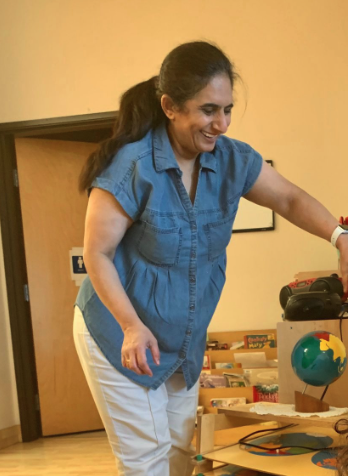
How to Prepare an Infant for Daycare
We wanted to give you information on how to prepare an infant for daycare. New parenthood is a magical time, but it’s also stressful and overwhelming. This is especially true when new milestones, such as taking your little one to daycare for the first time, occur. As with any change, however, all it takes to make the experience much more pleasant and manageable is some planning. It also helps to be informed and have your questions answered in advance to ease your mind.
In this article, we answer questions commonly asked by parents:
- When can infants start at daycare?
- Is daycare hard on infants?
- How long does it take to get an infant used to daycare?
We’ll also offer some helpful tips on how to prepare an infant for daycare so they’re sure to have a great time.
When Can Infants Start at Daycare?
There is no one-size-fits-all answer to this question, as the answer depends on the individual child and family. Some other factors to consider are:
- The length of your parental leave
- The flexibility of your work or school schedule
- Your need for regular breaks to reduce stress and improve your mental well-being
- The presence of other childcare options, such as relatives and in-home care providers
- Your partner’s ability to help with childcare tasks
- Your financial situation
- Your child’s temperament
- The quality of the daycare
Many daycares accept infants as young as six weeks of age. The key is to find a trustworthy, licensed provider specializing in providing care to infants.
Is Daycare Hard on Infants?
The answer depends greatly on how well you prepare your baby for the experience and the childcare center itself. This is why it’s essential to plan and follow the tips on how to prepare an infant for daycare that we provide later on in this article.
It is also crucial to choose a daycare that is well-equipped to provide a caring, supportive and safe environment for babies. Following these steps helps ensure a smooth transition from home to daycare.
How Long Does It Take to Get an Infant Used to Daycare?
Additionally, it is normal for infants to experience separation anxiety when they start daycare. While babies might find it challenging to adjust to a new environment initially, they will adapt once they become accustomed to their care providers and new playmates.
How soon they adjust depends on your baby’s personality and how well the infant daycare staff provides support and care. Some infants get over their separation anxiety in a few weeks, while others take a few days.
How to Prepare an Infant for Daycare: Helpful Tips
You can do several things to make entering daycare a positive experience for you and your little one.
Visit the Daycare in Person
Before the big day, drop by your chosen provider to discuss important details they need to know about your baby. Some things you may want to discuss are:
- Allergies and Sensitivities
- Feeding Times
- Nap Times and Sleep Schedules
Be sure to let the staff know about any special requirements your baby may have so they can accommodate them. This way, they can develop the perfect care plan for your little one.
Spend Some Time Away From Your Baby
If your infant has attachment issues, consider spending short periods away to make separation less of a shock when it’s time for them to go to daycare. Begin by playing peekaboo to reinforce the idea that, while you might be out of sight for a while, you’ll always return. Then, you can progress to spending a few minutes to a few hours away while leaving them with someone they know and trust.
Get Your Baby Used to Other People
Try to let your baby meet other, trusted people, like an aunt, uncle or grandparent. You could also take your little one on brief trips to the park or the grocery store so they could get used to seeing people other than you and others in your household.
Practice Saying Goodbye
A goodbye ritual can be soothing to babies and their parents and help prepare them for separation in a positive way. Some goodbye rituals you can do together are:
- Giving your baby a hug and a kiss
- Singing a goodbye song
- Reciting a funny little rhyme
Make goodbyes quick and cheerful, as emotional and drawn-out goodbyes could signal to your baby that something is wrong, further increasing their anxiety. In that vein, try to remain calm when it’s time to drop your baby off at the daycare.
It’s an emotional time, but if your little one senses or sees that you’re upset, they will only get more distressed. However, keeping your emotions in check will make them feel more secure.
Pack Everything Your Baby Will Need
The daycare center you choose will likely let you know which items they will provide and give you a list of things you’ll be expected to bring. You may need to pack the following:
- Diapers and wipes
- Bottles and milk
- Medications and vitamins your baby takes
- Spare clothes
- Blankets, sleep sacks and other sleep items
- Comfort items, such as pacifiers and teddy bears
It’s advisable to bring enough to last at least two weeks’ worth of items. Additionally, remember to leave a list of important phone numbers with the daycare center, such as your personal and work numbers.
Leaving your baby at daycare can be hard on parents, not just the baby. To help you manage your emotions and help your baby with the transition, you can arrange to drop by occasionally. Ask the daycare center if this is possible. Some providers also offer phone call check-ins to keep parents updated on their little ones’ well-being and progress, so this is a good option if visits aren’t possible.
Entrust Your Little One to a Top-Rated Infant Daycare Center in Plano, TX
American Montessori Campus provides a safe, secure and caring space for little ones aged six weeks to 18 months where they can thrive. Our infant daycare in Plano, TX, is well-equipped to support your baby’s potential for growth. Our facility’s features include:
Comfortable cribs in curated spaces designed for relaxation, preventing sensory overstimulation
Fun educational activities that promote creativity
Emergency, safety and security features
When you choose us as your daycare provider, you can be confident that your child will be in the competent, gentle hands of qualified daycare professionals. To learn more, please feel free to reach out to us.
